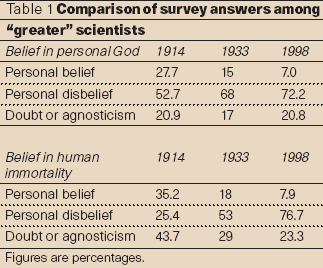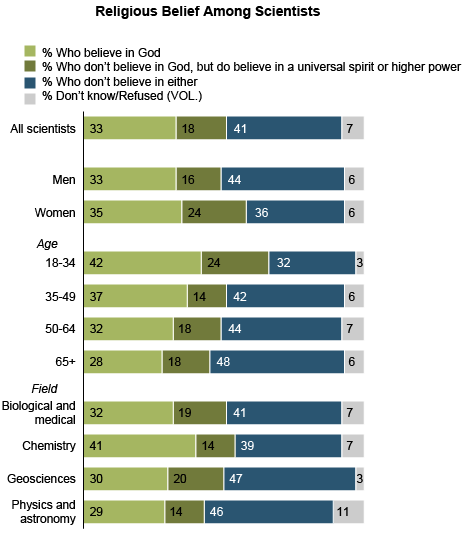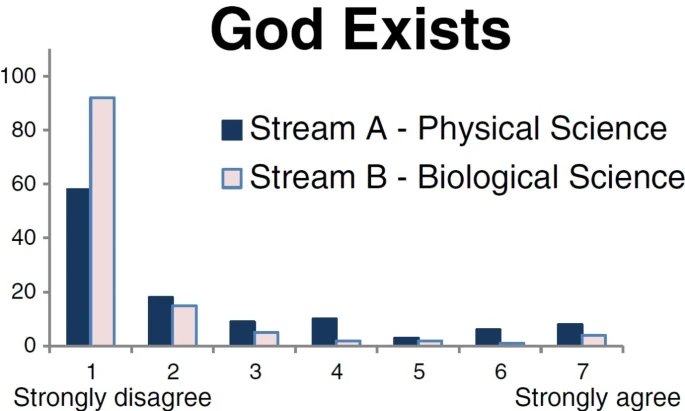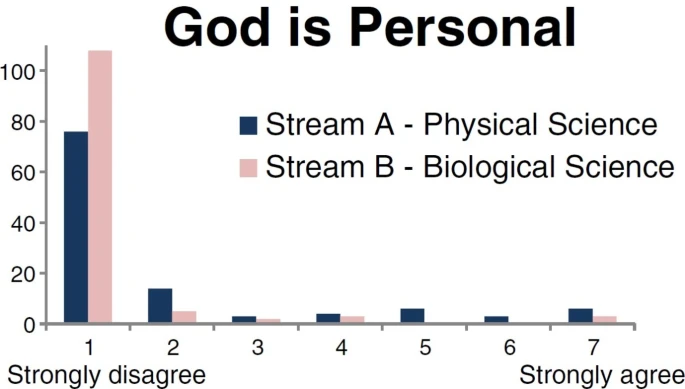A tenet defended by many advocates of classical theism, intelligent design, and natural theology is that the universe provides crystal-clear evidence of design, leaving everyone without excuse, as Christians commonly assert by quoting passages such as Romans 1 or Psalm 19. However, statistics suggest that scientists, especially physicists and biologists, may not necessarily see things that way.
The following quote comes from Leading scientists still reject God - Nature:
Our chosen group of “greater” scientists were members of the National Academy of Sciences (NAS). Our survey found near universal rejection of the transcendent by NAS natural scientists. Disbelief in God and immortality among NAS biological scientists was 65.2% and 69.0%, respectively, and among NAS physical scientists it was 79.0% and 76.3%. Most of the rest were agnostics on both issues, with few believers. We found the highest percentage of belief among NAS mathematicians (14.3% in God, 15.0% in immortality). Biological scientists had the lowest rate of belief (5.5% in God, 7.1% in immortality), with physicists and astronomers slightly higher (7.5% in God, 7.5% in immortality). Overall comparison figures for the 1914, 1933 and 1998 surveys appear in Table 1.
This other quote comes from Scientists and Belief - Pew Research Center:
The Pew Research Center poll of scientists also found that levels of religious faith vary according to scientific specialty and age. For instance, chemists are more likely to believe in God (41%) than those who work in the other major scientific fields. Meanwhile, younger scientists (ages 18-34) are more likely to believe in God or a higher power than those who are older.
Lastly, the following quote comes from Eminent scientists reject the supernatural: a survey of the Fellows of the Royal Society:
Fellows of the Royal Society of London were invited to participate in a survey of attitudes toward religion. They were asked about their beliefs in a personal God, the existence of a supernatural entity, consciousness surviving death, and whether religion and science occupy non-overlapping magisteria (NOMA). Overwhelmingly the majority of Fellows affirmed strong opposition to the belief in a personal god, to the existence of a supernatural entity and to survival of death. On 'NOMA’, the majority of Fellows indicated neither a strong disagreement nor strong agreement. We also found that while (surprisingly) childhood religious upbringing and age were not significantly related to current attitudes toward religion, scientific discipline played a small but significant influence: biological scientists are even less likely to be religious than physical scientists and were more likely to perceive conflict between science and religion.
If the universe provides crystal-clear evidence of design, how is it that physicists, who study the fundamental laws underlying everything, and biologists, who deal constantly with the complexity of biology, largely fail to believe in a designer God? How is it that something supposedly so obvious turns out not to be obvious for the vast majority of scientists?
I'm interested in published Christian explanations of why so many scientists are not theists.
NOTE: people who want to debate about design vs. non-design hypotheses should take it to chat, either here, here, or here.




